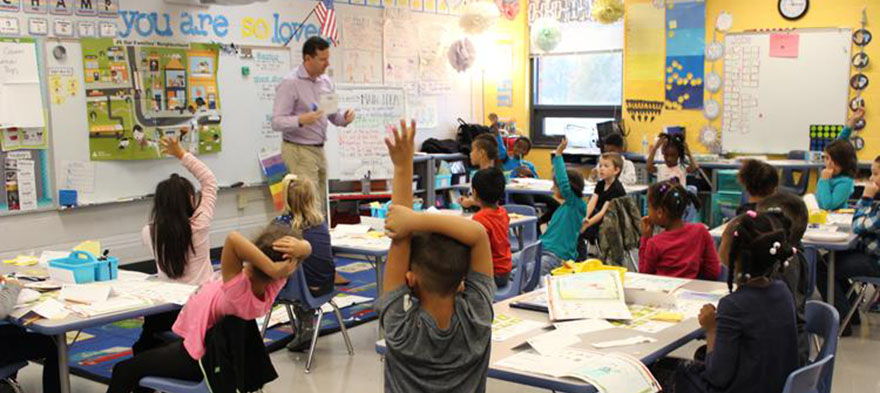Understanding that the content we put in front of children matters, 50CAN, a nonprofit network of citizen advocates, recently held a session on the importance of curriculum and instructional materials at its 2018 national summit. Mike Magee, CEO of Chiefs for Change, a bipartisan network of diverse state and district education chiefs, moderated the discussion. Two members of the Chiefs for Change community served on the panel, including Emmanuel Caulk, superintendent of Fayette County Public Schools in Kentucky. Here are lightly edited highlights of his remarks.
Fayette County is a decentralized system. We have 54 schools with complete autonomy. When you provide a high degree of autonomy, you assume the principal knows how to identify a high-quality curriculum and support teachers. But we found that wasn’t always the case. I am not saying that to cast aspersions on school leaders, but some of them were not making the appropriate choices. When we worked with a consultant to conduct a curriculum audit, we found huge disparities in our system, inconsistencies from school to school and classroom to classroom. [pullquote position="right"]Our high-poverty schools, in particular, were using a poor curriculum. [/pullquote] We took the findings of the audit and had conversations with our school leaders and decision-making councils about what’s best for children. We said, “We’re not here to take away or encroach on your autonomy. We believe in autonomy and know it brings innovation. But we all recognize that the number one resource for children is what we put in front of them. The curriculum has to be engaging; it has to be rigorous.” Our team looked at the Uncommon Schools charter network. It uses a high-quality curriculum across all its schools. In learning about that, we realized there are some things we need to have control over. For us to maintain quality and consistency, there are certain non-negotiables, including a great curriculum and related professional learning. No matter which school a child attends, we want to be sure he or she has an excellent instructional program. We conducted focus groups and surveys to ascertain what each group—teachers, principals, students, and families—wanted from a program. Next, we formed a curriculum committee that included district personnel, teachers, principals, students, and families. The committee took into full consideration the findings from the survey data and held curriculum fairs and presentations from selected vendors to provide all stakeholders with an opportunity to sample materials and weigh in on the adoption process. We publicized these events in a truly transparent way that was inclusive of all. [pullquote]Once the curriculum committee presented their findings and recommendation to the board, we had the full support of school leaders, teachers, students and families.[/pullquote]Therefore, once the board adopted a guaranteed rigorous and viable curriculum for core courses/subjects, our local school-based decision-making councils, exercising independent judgment, followed suit. Our team has also created district-wide learning guides and translated them into six languages, so families can see the standards. They can see what their child should be able to do at each grade level and can understand how to evaluate whether their child is on target. Through our Family University, we help families think about questions to ask when they meet with a child’s teacher—questions about standards, curriculum and assessments. So many people get the results of a test. That’s a piece of data that’s helpful. But we ask parents, “How many of you actually go back to the teacher and say, ‘Can you explain this to me?’” Think about it, when you take your child to the doctor and they do an assessment, you go back and find out the results. In school, children are taking an assessment. Parents need to be partners, and we need to help them think about how to have those conversations. So, we share our assessment timeline and give them the sentence frame. If they need sentence starters, we give them ideas about what to say. Due in part to the changes we’ve made, our families, teachers, and principals now increasingly recognize the important role that curriculum and instructional materials can play in improving student learning.

Leave a Comment